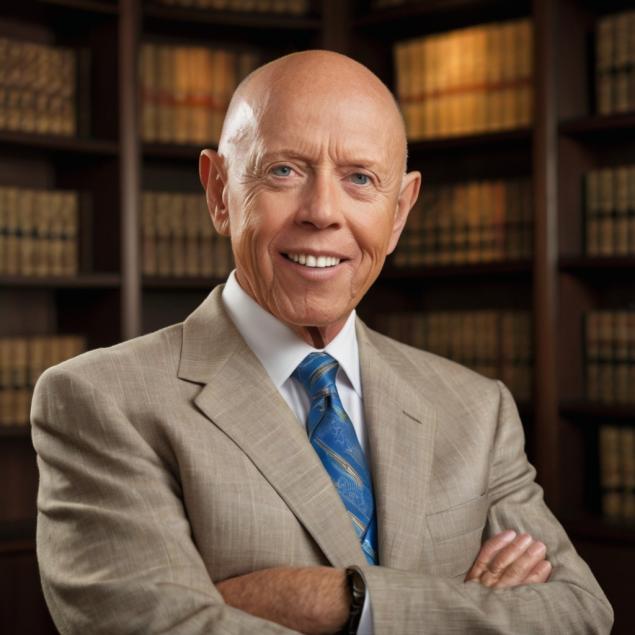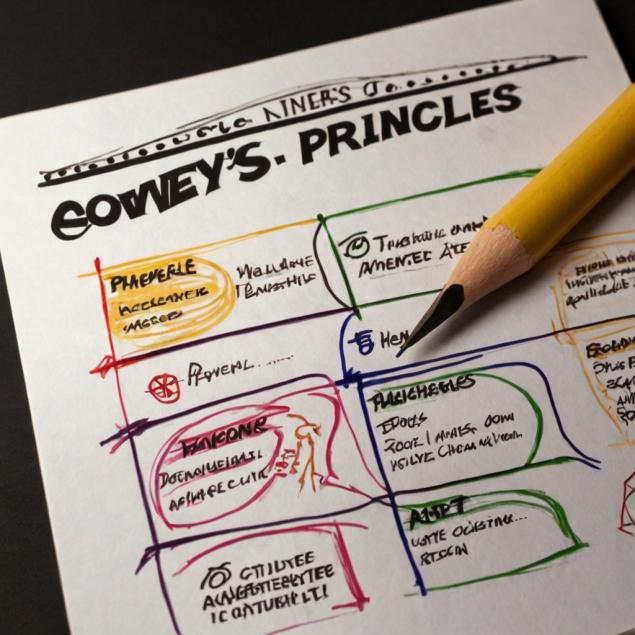179
Stephen Covey on True Greatness: 5 Wisdom Lessons for an Effective Life

Introduction. Stephen Covey, author of the legendary book 7 Habits of Highly Effective People, has made tremendous contributions to personal growth, leadership and corporate culture. His ideas have long gone beyond the business environment, becoming an integral part of modern psychology and tools for self-development in all spheres of life. But, in addition to the "seven habits," Covey developed a concept of authentic ("true") greatness that differs from ostentatious success and high-profile titles. He believed that true greatness lies in a deep understanding of one’s values, responsibility to others and the ability to build harmonious relationships with the world.
In this article, we will look at five main lessons of Stephen Covey, directly related to his vision of “true greatness”. They will help you look at success not just as a result of material achievements, but as a harmonious strategy that allows you to lead an effective and at the same time deeply meaningful life. We will try to avoid being tied to specific dates or events so that the material remains relevant in any context.
1. From Win-Win to True Interest in the Other
One of Covey’s most well-known principles is the Win-Win setting, when any interaction seeks a solution that benefits all parties. At first glance, this sounds like a “perfect” negotiating model, but Covey stressed that such an attitude should not be based on manipulation, but on a sincere desire to understand the needs of the other side. Win-Win is not just a compromise, it’s a philosophy in which everyone feels valued.
- Practical advice: Before you propose a deal or project, research in detail what your partner/colleague/close person wants. Only then will your joint decision be truly “winning”.
- Psychological effect: This model reduces mutual suspicion and creates a healthy environment conducive to long-term relationships.
2. From Time Management to Self Management
Stephen Covey has repeatedly stressed that the main problem is not that we have little time, but how we prioritize. We can make endless lists of tasks, use various gliders, but if we do not understand our true values, all this “optimization” can turn into a meaningless clutter of the calendar.
- Idea: Focus on what is really important, not what is urgent.
- Council: Analyze how much time is spent on small things that have little to do with your life goals. Try introducing time modules that focus entirely on big projects or deep family values.
3. The power of proactivity
In 7 Habits, one of Covey’s central thoughts is “proactivity”: the ability not only to respond to external circumstances, but also to take the initiative into one’s own hands. He said, “Between stimulus and response lies freedom of choice.” We can blame circumstances, governments, bosses, weather and everything, but ultimately our lives change when we take responsibility for our own decisions.
- How to apply: When something goes wrong, ask yourself, “What can I do in this situation?” This shifts focus from a passive position ("What to do, life is not fair...") to an active one ("What can I do?").

4. “Thinking of abundance” instead of “deficiency”
Another aspect that Covey talked about is the way we look at the world, whether through the prism of abundance or scarcity. Scarcity Thinking assumes that everything in the world is limited: if someone wins, I lose. The “abundance mindset,” on the other hand, asserts that resources and opportunities are sufficient for all, and that the success of one does not take away the chances of the other.
- Benefits: When you think in terms of abundance, you're more likely to collaborate, to exchange ideas, to seek synergy. This improves the overall mood and expands the range of possibilities.
- Example: If a colleague is successful, support them, learn from their strategy, not feel envious.
5. Contribution to other people’s lives as a criterion of “true greatness”
Stephen Covey argued that true greatness is not measured by the prestige of a position or the amount of capital, but by the contribution we make to the lives of others. This can be leadership by the principle of service (servant leadership), willingness to share knowledge, help others to reach their potential. Unlike “show greatness” based on ego and power, “inner greatness” calls for shared growth.
- Why this is relevant: In an era in which many people strive for “fast success,” it is often forgotten that true impact is measured not by the number of likes but by the real positive impact on people and society.
- How to practice: Look for opportunities for mentality, charity, free exchange of experience. This will not only help those around you, but also strengthen your reputation as someone you can rely on.

Why Covey's lessons remain relevant today
Times are changing, business models are reshaping, communication techniques are evolving rapidly, but the basic principles that Stephen Covey preached remain “timeless.” Here are a few reasons why their importance does not fade:
- The universal nature of human values: Honesty, responsibility, empathy – these qualities are the foundation of productive relationships in all areas.
- Global context: Covey wrote his books from Western culture, but the principles of family, leadership and self-development are international.
- Long-term practice: “7 Habits” has not lost its popularity since its release; they continue to be studied in corporations, universities and private trainings around the world.
How to Introduce Covey Ideas into Everyday Life
- A clear definition of values: Before you “optimize” your schedule or make a career leap, figure out what really matters to you in the long run.
- Regular self-reflection: Analyze at least once a week how you spend your time and energy. Are they consistent with your values?
- Proactive problem solving: Instead of complaining about circumstances, try to formulate specific steps, even minimal ones, to influence the situation.
- Implementing the Win-Win approach: In any disputed or work situation, look for ways in which both sides could win something.
- The practice of “live” contacts: In the digital age, personal conversation can work wonders. Try not to shy away from direct communication, build human connections.

Conclusion
Stephen Covey is remembered as the man who formed one of the most holistic systems of views on personal success, leadership and “true greatness.” His concepts, outlined in the books “7 Habits of Highly Effective People”, “The Eighth Habit” and other works, offer not only a set of tools for achieving career heights, but also a deep philosophical approach to life. “True greatness” in Covey is not the pursuit of external regalia, but the recognition of their responsibility to the world, the ability to prioritize and willingness to help others.
If you want to be effective not only in terms of results, but also in terms of personal satisfaction and well-being, then Covey’s ideas can serve as a reliable compass. Remember that every goal becomes more attainable when backed up by a systematic approach to self-organization, sensible empathy for others, and a focus on the underlying values that make up the meaning of your life. Bottom line: “greatness” can be quiet, modest, but it does not lose its power, and this is the key to feeling like a full-fledged creator of your destiny.
Motivational quotes for moving forward: the 27 strongest
Be yourself: 10 things that will happen when you become real























